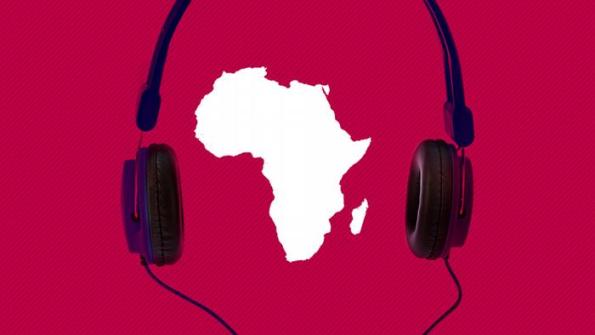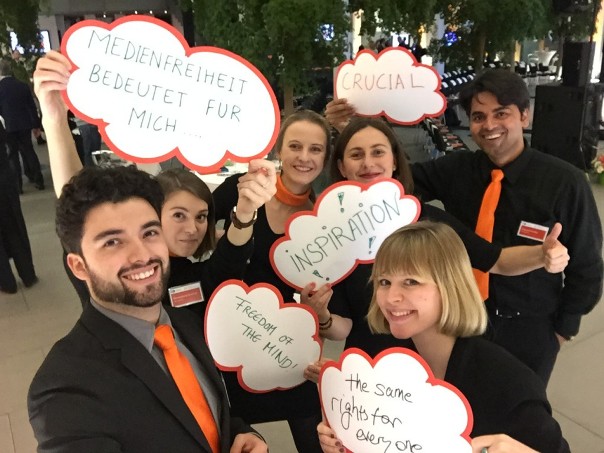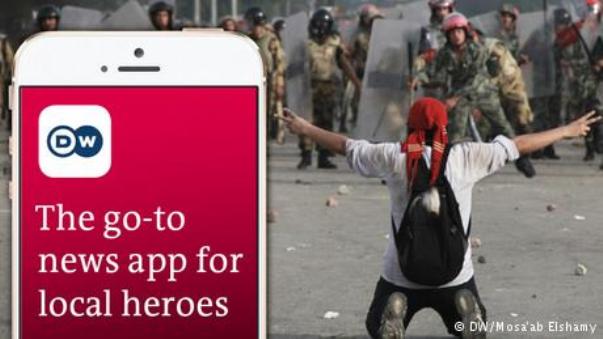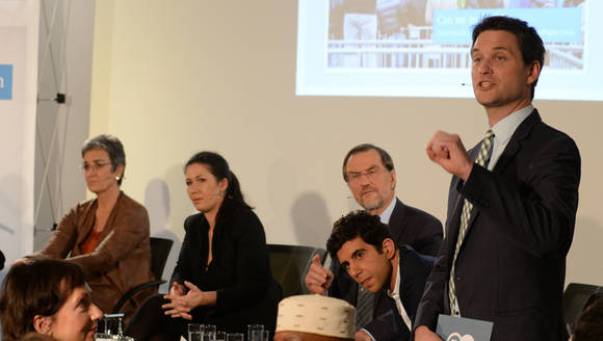Market roundup: February 2016
Africa
Several radio partners in Sub-Saharan Africa are expanding cooperation with DW. In Nigeria, Radio Gombe is acquiring English and Hausa radio programs. The station covers the states of Yobe, Borno and Adamawa. In Congo, Radio Mwana is acquiring DW’s complete French programming lineup, with stations in Mbandaka and Gbadolite that reach more than 750,000 listeners. A new radio partner in Mbuji-Mayi, Radio Fraternité, will be broadcasting one hour of French programming daily to a potential 500,000 households. In Ghana, the Internet radio broadcaster Ghana Waves Radio now includes DW live streams in six languages. The streams are also included on the Ghana Waves app and on-demand. DW radio live streams and newsfeeds in a variety of languages are also available now across Africa on the Africa Live Radio and News App.
The Liberian state broadcaster LNTV is now broadcasting one hour of DW programming every day. LNTV is the only Liberian TV broadcaster with nationwide coverage. Included in the programming package is DW News, Euromaxx, Kick off!, and In Good Shape.
In Tanzania, DW is the first international news provider available on the video-on-demand platform SIMUtv. The app has already been downloaded 100,000 times.
Asia
DW has expanded cable network partnerships in India and Bangladesh, with several cable providers acquiring DW’s English channel. This increases DW’s technical range by 400,000 households in Bangladesh and by 250,000 households in the Indian states of Bihar and West Bengal.
The Bengali-language app Kokil now includes an RSS feed with content from DW Bengali. The app currently has 50,000 users.
DW’s English-language channel is now part of the line up on Star Cable Network, the largest cable network in the Afghan capital, Kabul.
South America
The Colombian news website Publimetro now features a DW content box with Spanish-language news articles from DW. Publimetro belongs to Metro International, a well-known publisher of free newspapers in cities around the world. The Publimetro news portal registers 3.2 million unique visitors every month.
Europe
DW has a new Smart TV partner in the United Kingdom. The OTT provider Vision247 is now broadcasting DW’s flagship English channel in its entirety on the free-to-air entertainment portal, Vision TV. The portal is available on the digital TV service Freeview on channel 244 and can be received by a potential 7.3 million households in Great Britain. Vision TV is also available for mobile devices and on web-TV.
DW journalists demonstrate the power of storytelling
What drives some people to push themselves to the edge and keep coming back to the world’s most rugged and treacherous mountains? DW sports journalist Stefan Nestler tells these stories and makes it clear that mountaineering is more than a sport, it’s a lifestyle.
Nestler’s mountaineering blog Adventure Sports takes a special look at people who live for reaching the next peak. The blog also places a special emphasis on life in the Himalayas – both for locals and the cadres of mountain adventurers whom descend on the region each year.
The blog recently won a Sport Media Pearl Award in the Journalistic Weblog category. The contest, organized by the International Sports Press Association (AIPS), is considered one of the most important international sports media awards and recognizes outstanding storytellers in sports.
Nestler dedicated the award to “climbers from all over the world who live their passion and to the mountain people who must work so hard.” But Nestler isn’t the only DW journalist being honored with awards.
Jaafar Abdul Karim, the host of DW’s Shabab Talk and other productions covering the Arab world ranked third place as Medium Magazine‘s “journalist of the year” in the category nationwide reporting. Medium said that that Karim was a “perfect mediator” between Germany and the Arab world. Karim uses a unique approach to storytelling that helps contextualize and clarify issues facing young Arabs. He also produces a video blog that keeps up with the latest issues and controversies.
Another distinction was presented by Kosovo’s public broadcaster, RTK, which honored DW’s Bahri Cani with a “Journalist of the Year” award. The journalist with DW’s Albanian department was recognized for live news reports in Albanian and Serbian, which provide a valuable service to speaker’s of both languages in Kosovo. Cani’s work also distinguishes DW as an objective and reliable source of information in the region.
Live reports from DW have been included in RTK’s morning broadcasts for more than three years. RTK also carries the Albanian edition of DW’s, Focus on Europe, along with Euromaxx, Drive it! and Tomorrow Today.
Two DW Portuguese for Africa correspondents were also recognized for their outstanding journalistic achievements and commitment to human rights. Braima Daramehat won a “Journalism and Human Rights” prize from the Observatório dos Direitos Humanos based in Guinea-Bissau. His work as director of the local youth broadcaster Rádio Jovem earned him the distinction. The station’s programming emphasizes human rights, freedom and democracy. DW’s radio dramas Learning by Ear and Crime Fighters are broadcast in Portuguese by Rádio Jovem.
Luciano Nagel, a DW correspondent in south Brazil won a Prêmio CNT de Jornalismo for his report on the working conditions for Brazilian truck drivers. Nagel has also produced stories for DW covering African refugees in Brazil.
DW has exciting opportunities for young journalists
The journalism traineeship from DW Akademie gives young journalists a unique chance to gain hands-on experience in professional media at Germany’s international broadcaster. DW’s paid traineeship covers a range of essential skills for modern journalists ranging from TV moderation and multimedia storytelling to data journalism and social media.
The application period, which begins on January 11 and closes February 29, is the first step of a challenging four-step process where applicants will showcase their talent and motivation. Selection is competitive and those who succeed can be assured that their fellow trainees share their drive and interest. Native speakers of English with good knowledge of German are especially encouraged to apply.
After an applicant is selected the traineeship begins in September. The 18-month program challenges perspectives and develops talent by combining practice with theory. Each trainee will spend time working with one of DW’s editorial departments writing and producing reports for radio, television and online.
DW trainees also participate in large-scale, international media projects. In 2015 the multimedia project “meine Oma, das Regime und ich,” won a CNN Journalist Award. The project was a collaborative effort from trainees who profiled their grandmothers’ experiences living under dictatorships. DW trainees also work in projects outside DW, like the SkillsXchange program, which was a group of young European journalists working on reporting the Prix Italia media awards.
Any further questions can be answered here.
Market roundup: January 2016
Mobile
The DW app has generated over 1 million downloads in the first six months since its release. The app is also among the top-ranking news apps in the Google Play Store charts for target markets like Egypt, Nigeria, Ghana and Pakistan.
South America
Chile’s leading television channel, T13, is a new DW partner and the channel’s website now includes Spanish news content from DW. T13’s is one of the most trusted sources of news in the Chilean media landscape and their online presence reflects this standard of quality. The website currently records over 5 million users and is expanding on mobile devices and social media.
Asia
DW’s English channel is now available on the Bangladeshi multi-system provider DigiJadoo as a part of its basic package. The multi-system provider serves all major cities in Bangladesh and has over 7 million subscribers.
DW is now available on three cable providers in Taiwan. NCDT, NTC-TWT and New Changhua Cable provide three provinces with international channels.
America
DW’s English channel has a new full-time partner in the USA. Ventura Broadcasting based in Fresno, California will be providing the channel on its free-to-air service to around 100,000 households.
DW provides a balanced perspective on the refugee crisis
The continuing influx of refugees into Europe has presented a divisive challenge to the EU, with discussions of entry quotas, border controls, blame and shame scattered across newspapers, websites and nightly broadcasts all over the continent. Germany and its refugee policy have been placed in the heart of the storm.
Recently in Brussels at the Representation of North Rhine-Westphalia to the European Union, DW hosted a panel discussion, “Can we make it? The impact of the media on Europe’s refugee crisis.” Experts, politicians and journalists explored how the ongoing refugee crisis in Europe is challenging the EU and what role the media plays.
The discussion was attended by around 200 people and presented unique and valuable perspectives from European politics and media.
Ulrike Lunacek, a European Parliament Vice-President from Austria, addressed the issue from the perspective of EU politics, saying that the refugee situation itself didn’t constitute a crisis, but rather lack of political will in the EU.
A plurality of ideas from different European media at the discussion showed that the portrayal of the refugee crisis differs from country to country. Jaafar Abdul Karim, the host of DW’s Arabic talk show Shabab Talk, pointed out that it was important for the media to get the point of view of refugees, rather than only reporting about them. Karim has produced a series of video blogs for DW and Spiegel Online where he frequently speaks with refugees. French journalist Adeline Percept said that French media differs from Germany, with reporting that tends to be “one-sided.” The Polish journalist Piotr Jendroszczyk said that the media in each EU member state was depicting a “different reality” of the refugee situation.
As Germany’s representative in the international media landscape, DW has an important role in explaining and clarifying the complicated implications of the refugee crisis, along with providing hard news reports of developing situations at borders and in refugee centers.
DW has even gone a step-further and provided an online guide to Germany for refugees in Arabic, Dari, Pashtu, Urdu, English and German. The website explains everything from visa and housing regulations to adapting to cultural norms and learning the language. As more refugees continue to arrive in Germany and the humanitarian challenges are addressed, the political discussion continues.
Whatever reality is chosen to be portrayed, the refugees are continuing to arrive and the EU continues to face a great challenge.
An edited version of the discussion will be aired December 15 on DW.













Feedback